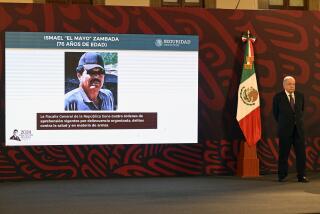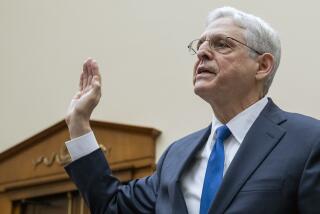CIA, Lawmaker Trade Charges Over Covert Operation : Intelligence: Agency’s acting director denies any cover-up surrounding Guatemala murders. Congressman won’t back down in rare public tussle.
WASHINGTON — In a rare and bitter public exchange over a clandestine operation, a top CIA official angrily denied accusations Thursday that the spy agency had acted improperly in withholding information about the murder of two men--one an American, the other the husband of an American--in Guatemala.
Adm. William O. Studeman, acting director of the Central Intelligence Agency, accused an influential member of the House Intelligence Committee of leveling a “completely false and utterly irresponsible charge” that the CIA and, later, the Clinton Administration, covered up information that a paid CIA informant had ordered the murders.
But the congressman, Rep. Robert G. Torricelli (D-N.J.), held fast to his accusations, which he outlined in a letter to the White House, and asserted that the revelations are strong evidence that the mission of the CIA must be redefined.
“It obviously needs restructuring,” he said. “This operation needs to get under control.”
The exceptionally acrimonious exchange, unusual in that key Washington officials were talking publicly about one of the spy agency’s secret operations, comes as the CIA is undergoing both internal and external evaluations aimed at defining its role in the post-Cold War world.
*
Joining forces with the critics Thursday was Jennifer Harbury, the widow of one of the victims who has protested and fasted in an effort to force the government to reveal the fate of her husband. She alleged that U.S. officials had failed to confirm his death, choosing instead to conceal it to cover up their mistake.
“It’s pretty obvious why they didn’t want me to know,” she said in an interview. “The man responsible was on the CIA payroll all along. . . . They were giving me intentional disinformation.”
White House officials, also accused by Harbury and at one point Wednesday by Torricelli for conspiring to withhold information about the deaths, insisted that Clinton Administration officials never purposely kept Harbury in the dark.
“On behalf of the White House, we have a great deal of sympathy for her situation,” spokesman Mike McCurry said of Harbury. “Our heart goes out to her.”
From interviews over the last two days with sources within the CIA and the Administration, this chain of events has emerged:
Col. Julio Roberto Alpirez, a Guatemalan military intelligence officer, was hired as a CIA informant in the late 1980s and began providing information to U.S. officials about the abduction in 1990 and subsequent murder of Michael DeVine, an American citizen living there. But later, the CIA was told through other channels that Roberto actually was present at the slaying and had even ordered the murder.
At that point, according to CIA sources, his contract with the agency was canceled and “they stopped all relations with the guy.”
In March, 1992, Harbury’s husband, leftist guerrilla Efrain Bamaca Velasquez, also was captured, then tortured and executed. But the CIA sources said they did not develop official information that Bamaca indeed had been killed and that Roberto had directed this murder, too, until early this year.
The CIA said that it immediately advised the National Security Council and congressional oversight committees. “The agency shared all of this information with the appropriate U.S. government authorities,” Studeman said.
That account squared with statements from the White House, where McCurry and other officials disputed Torricelli’s charge that the CIA deliberately withheld information from the White House. That, said McCurry, “is just not true.”
Rather, McCurry said, the White House believes that the information either went astray or was withheld through honest error.
“It is not necessarily the case that everyone is aware of every piece of information at all times,” he said.
*
McCurry said that National Security Adviser Anthony Lake told Harbury in November that the U.S. government did not know whether her husband was alive. But he promised to pursue the issue.
Later, with new information developed by U.S. intelligence sources in January, McCurry said, it “suggested in more concrete terms” that Bamaca had died shortly after being taken captive.
“Based on that new information, the State Department told Jennifer Harbury on Feb. 8 that the information that was available to us at that point, while it was not conclusive, suggested that her husband had been killed following his capture,” McCurry said.
Meanwhile, Studeman has ordered the CIA’s inspector general’s office to review the entire matter.
More to Read
Sign up for Essential California
The most important California stories and recommendations in your inbox every morning.
You may occasionally receive promotional content from the Los Angeles Times.












